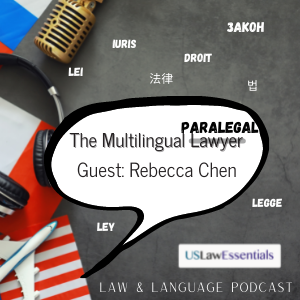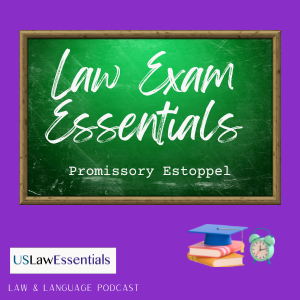Speaker 0 00:00:00 Welcome to the U S law essentials law and language podcast, the legal English podcast for non-native English speakers. That helps you improve your English, listening, improve your legal English vocabulary and build your knowledge of American legal
Speaker 1 00:00:16 Yay. All the honor, and wanting to go on there and give their attention. I'm Daniel Wilson
Speaker 2 00:00:26 And I'm Steven Horowitz.
Speaker 0 00:00:28 Today's episode is part of our what's new and legal news series, where one of us picks a legal news event to talk about today. It's Steven's turn. So Stephen what'd you pick for us?
Speaker 2 00:00:40 Uh, I found an interesting article. It says judge get six months suspension, partly for misusing her contempt power. This article is from the ABA journal, which
[email protected]. That's the American bar association.
Speaker 0 00:00:58 Uh huh. All right. Well, we have that, that link in our show notes suspended. What, what does that mean? That she's been suspended.
Speaker 2 00:01:07 That means, I guess she's not allowed to work as a judge for six months and then I guess she'll come back to work. Okay.
Speaker 0 00:01:13 Okay. And it says partly, partly from misusing her contempt power. Before we talk about contempt power, what does that mean? That it's partly for misusing her contempt power.
Speaker 2 00:01:24 Uh, it sounds like they had a couple of reasons for doing it, but the main one they want to focus on is that she misused her contempt power. Do you know about contempt then?
Speaker 0 00:01:37 Yeah. Um, contempt is a legal term, but, but is it always a legal term? What does that mean?
Speaker 2 00:01:47 Oh, well, yeah, there's a plane meaning, uh, there's a plane meaning version of contempt and there's a legal meaning of contempt. Um, so if I feel contempt for you, I mean hatred or, or, um, I don't like you if I feel contempt for you, but the legal term contempt is something that a judge, uh, contempt power means a judge. If they don't like what somebody is doing in their courtroom, unrelated to the case, if somebody's being rude or if somebody's somebody does something inappropriate or dangerous, um, the judge can hold the person in contempt and can make them leave. The courtroom can find them, can even put them in jail just for that crime of contempt.
Speaker 0 00:02:37 Okay. So if she misused her contempt power, what does that mean?
Speaker 2 00:02:46 I would think it means that somebody was not doing something bad, but she didn't like them. And she decided to use her to hold the person in contempt anyway, which seems kind of scary. Can you imagine being in a courtroom and the judge decides to go a little bit crazy with their power and hold you in contempt?
Speaker 0 00:03:08 Yeah, that is scary because judges are in a position of power anyway. And according to this article, this judge wasn't just criticizing people. She was actually using her, her legal power to impose punishments on people, even when those punishments might not have been appropriate.
Speaker 2 00:03:36 Yeah. Yeah. And, um, so what's another thing that's kind of interesting is that this judge, her name is Liris Yonge. If I'm pronouncing it correctly. Um, she works for the Philadelphia county court of common pleas in Pennsylvania, which sounds like a local trial level court in Philadelphia, which is a big city in Pennsylvania. Um, and, um, but the court that decided this is called the Pennsylvania court of judicial discipline,
Speaker 0 00:04:09 That's worth repeating. So this is called the pencil Pennsylvania court of judicial discipline,
Speaker 2 00:04:18 Right? It's like a special court just for punishing judges. So if so, if you're a regular person and you do something wrong, you go to court. But what if you're a judge and you do something wrong that has to do with your judge powers that you misuse your judge powers. I guess you go to the Pennsylvania court of judicial discipline if you're a judge in Pennsylvania.
Speaker 0 00:04:39 So this must be a really unusual experience for a judge because all of a sudden, she's not presiding over a court. She's actually in court and she's being accused of doing something wrong.
Speaker 2 00:04:57 Yeah. She's like a defendant and this is what they said that she did. She misused her contempt power against those who be, who appeared before her. In one instance, she ordered the detention of a mother until that mother brought her children to court. And she did that without folding a contempt hearing. Can you believe that? So there's, so there's a mother who wouldn't bring her children to court, probably because it's hard to bring your children to court because children generally don't like to sit around in a court and that's not what they're comfortable with. And also because the children have to be in school or maybe because the mother has to work. So that seems pretty harsh. And then in another situation she imprisoned a non-party for 21 days.
Speaker 0 00:05:51 So it sounds like imprisoned and detained are, are, are similar words. So, so in both of those cases, she, she detained someone and then she imprisoned someone and she had the power to do that, I guess, without even giving those people a trial.
Speaker 2 00:06:17 Yeah. So, uh, and, and the in detention and imprisonment, I guess are similar, but a little bit different that detention maybe is you have to stay in the court for a long time, but I, I'm not clear if that meant being in jail, but then the other person was actually put in prison and they were a non-party. Do you know what a non-party is?
Speaker 0 00:06:38 I can, I can guess it's a person not invited to a party,
Speaker 2 00:06:43 Uh, a little bit different than that. I mean, I guess a non-party could be like, if you invite people over and they don't come, that would be a non-party. But in the, in the legal sense, a non-party means it's not the plaintiff or the defendant is just somebody who's there to watch the trial. Maybe it's a family member or maybe it's, uh, just somebody who wandered in, but whatever it was, she didn't like that person. And she put them in jail for 21 days
Speaker 0 00:07:12 That does seem like an abuse of power. And so when they say they that she misused her contempt power, I guess they could say that she really abused her power.
Speaker 2 00:07:27 Yeah. Yeah. And, and it, and it wasn't just about the contempt power. Also, it says that she exhibited improper demeanor, which means that it means basically bad behavior by harshly belittling and engaging in sarcastic behavior toward those appearing before her.
Speaker 0 00:07:48 Oh, wow. Also look at the adjectives that followed that, that, that sentence, they describe her behavior as can I read this impatient discourteous, disrespectful, condescending, and undignified.
Speaker 2 00:08:09 Right. And, and these are all, I don't know that these are illegal English words, but they're words that have sort of a formal meaning and need to be used in a situation like this. So there's sort of, I guess you could call them sub technical, legal, uh, legal English vocabulary. So harsh means, uh, extremely or harshly. It's very seriously. Um, belittling means insulting, making fun of somebody. Um, what about sarcastic? You know, that word?
Speaker 0 00:08:45 Yeah. I'm sarcastic, I'm told it comes from Greek and it means the ripping of flesh. Wow. Sarcasm sarcasm can be really insulting. Um, especially when it comes from someone who has power over you.
Speaker 2 00:09:08 Yeah. Sarcasm is when you say one thing, but you really mean the opposite of that. And it's very obvious that that's what you mean. And it's, it's very intimidating coming from a judge, I think. Um, and then the sentence you read, um, impatient discourteous, and he's rude to a formal way of saying rude, disrespectful condescending is when you talk down to somebody, um, like they're less important than you and undignified. What do you think about undignified?
Speaker 0 00:09:39 That's really interesting. Cause the other words are saying that she's someone in power. Who's not treating other people with sufficient respect, I guess, but to let, to be undignified, I guess that would be to lack dignity. What are the expectations of a judge with respect to dignity?
Speaker 2 00:10:04 I mean, that's a big, that's a big part of, of judicial culture, you know, being dignified and having dignity. And that that's part of what gives the court system. It's credibility. That's why people follow the court's orders. If people don't respect the court, then they're not going to take what the court does seriously. So dignity is very subjective, but it's also a very important, uh, part of court culture. Um, and then it's interesting that it said the court views this case. So this is the court of the Pennsylvania quarter of judicial discipline. Um, the, the head of that court said the court views this case as the most egregious one involving rude, demeanor failure to timely proceed and imperious action as it has seen. I think there's a couple of good adjectives in there too. Egregious
Speaker 0 00:11:02 Isn't legal English technically, but it comes up a lot in the legal context where you're, where a person can be subject to a particular kind of punishment or can violate a certain type of law or obligation based on egregious conduct.
Speaker 2 00:11:28 Right. And egregious just means it's like saying extreme, but it's a, it's kind of a formal word. So it, it has, it has, I think more power when people say egregious and it, it helps it's like an effort to try to persuade a listener that even though extreme is a subjective term, it's somebody's opinion, whether something is extreme, agregious makes it feel more objective. Anybody would know this,
Speaker 0 00:11:55 Right? It wasn't just one person thinking that this, this judge was being rude rather upon review this court determined that her conduct was actually agregious.
Speaker 2 00:12:09 And then the other interesting word is imperious. Uh, her imperious action and imperious is, is saying that she's acting like a king or a queen like royalty. And that's kind of the opposite of how Americans want to see our legal system. We, you know, we Americans rejected England, which had a king and instead we have a president in a democracy. So imperious feels like a very negative word.
Speaker 0 00:12:38 Yeah. It's interesting to contrast it with dignity, right? So dignity is a really positive word. And sometimes I would associate dignity with people who are very important or even with royalty, but it has a very positive meaning. Imperious is always negative.
Speaker 2 00:12:58 It had sort of a, an emotional reaction to this. And I have to say that after reading this article, I think I actually feel contempt for this, for this judge who misused her, her contempt power.
Speaker 0 00:13:11 Okay. Well, Steven, I hope you can calm down and you get over your feelings of contempt. Don't be imperious. Thanks very much.
Speaker 2 00:13:19 Okay. I'll try to retain my dignity
Speaker 0 00:13:22 If we all will. Thanks for listening to the U S law essentials law and language podcast, and remember, stay essential. Also keep in mind if you'd like to further improve your legal English and your understanding of us law, please be sure to check out the synchronous and asynchronous course offerings on the U S law essentials website. Talk soon.


